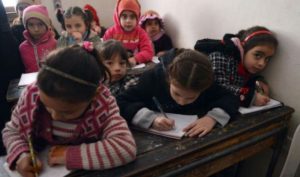Refugee children a potential asset – studies
 Refugee children are high achievers with a strong will to contribute and connect to their host societies, a raft of new research has found.
Refugee children are high achievers with a strong will to contribute and connect to their host societies, a raft of new research has found.
According to the UN High Commissioner for Refugees (UNHCR), more than half of the world’s refugee children – 3.5 million individuals – do not attend school.
And for those who do, education can often be difficult. Fitting in to a new country and struggling amid the various stereotypes of refugees that exist in many countries can be a challenging experience for these children.
However, new research shows that despite these challenges, young migrant and refugee children around the world achieve high levels of academic success.
A study by the Organisation for Economic Co-operation and Development (OECD) in the UK found that 58 per cent of people aged 25-44 with foreign-born parents go into higher education, compared with 46 per cent of those with British-born parents.
Another OECD study, which reviewed migrant education in Australia, found students from the Philippines, China and India are more likely to achieve baseline academic proficiency than their Australian-born counterparts.
And results from the first census of young Australians from refugee and migrant backgrounds has revealed that most migrant and refugee children are confident in their ability to achieve their goals, be it work or study.
Almost 2,000 young people took part in the Multicultural Youth Australia Census, conducted by researchers from the University of Melbourne’s Youth Research Centre in September and October 2017.
According to the study, 87 per cent of participants said they feel ‘positive’ or ‘very positive’ about reaching their future goals, with the top two values and goals being ‘having a job they were passionate about’ (61 per cent) and ‘being active in working for a better society’ (45 per cent).
“This is despite almost half (49.6 per cent) indicating that they were unemployed or underemployed, with racial discrimination the most commonly cited reason for why it is difficult to find work,” University of Melbourne Professor, Johanna Wyn, said.
Professor Wyn said if we want to live up to the image of Australia as the most successful multicultural society in the world, it is time to stop scapegoating migrant youth as criminals or extremists.
“This census reveals that migrant and refugee youth are socially-connected and have a strong civic and participatory outlook,” she said.
“It’s time to fund programs and create opportunities that capitalise on their optimism, civic capacities and desire to belong. The diversity of Australian society is shaped by migration, so we must do more to support these young people to feel valued and safe,” Prof Wyn said.
Another study by migrant and refugee settlement agency AMES Australia found that a key desire for refugee youth was to contribute to their new communities
It found that education and getting work were also important priorities for young refugees.
AMES Australia CEO Cath Scarth said the survey’s findings showed that overwhelmingly refugees newly arrived to Australia had positive, optimistic attitudes and were keen to work and contribute to the country.
“The findings from this study indicate that newly arrived refugees are not passive bystanders but are actively engaged in forging a new life and demonstrating a high level of ingenuity and resilience to adapt to life in their new country,” Ms Scarth said
Culturally and linguistically diverse (CALD) education specialist Dr Ian Pringle said host societies would do well to encourage and harness the innate talents and resilience of refugee children.
“The data shows that refugee children are a potential asset for hoist societies and we know that they bring with them great resilience, innovation and resourcefulness,” Dr Pringle said.
“If we were to harness the potential of these young people simply by making sure they all received the education and support they need to adjust to their circumstances in countries like Australia, the net benefit to them and to the society as a whole would be tremendous,” he said.
“We’ve all heard the stories of refugees who have become billionaires or famous artists for sportspeople.
“But the fact is that there are many refugees living more ordinary lives who are making significant contributions to society through volunteering, through sharing their experiences and through simply adding to the richness of our cultural and social life,” Dr Pringle said.
Laurie Nowell
AMES Australia Senior Journalist












